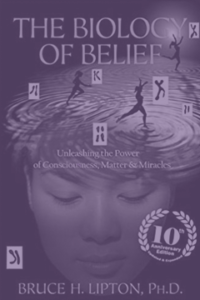Mindset Masters: Bruce Lipton
 Welcome to the second instalment of my new blog series Mindset Masters. In this series I’m exploring some of the authors that have inspired me most on my journey to being a ‘retirement rebel’ – challenging the way we live our lives after the age of 50.
Welcome to the second instalment of my new blog series Mindset Masters. In this series I’m exploring some of the authors that have inspired me most on my journey to being a ‘retirement rebel’ – challenging the way we live our lives after the age of 50.
Last month, I discussed James Allen’s book As a Man Thinketh. In this blog I’m looking at a more recent work, delving into Dr Bruce Lipton’s The Biology of Belief.
Dr Bruce Lipton is a renowned cell biologist by training who taught cell biology at the University of Wisconsin School of Medicine and later performed pioneering studies at Stanford University School of Medicine. He has been a guest speaker on hundreds of television and radio shows as well as a keynote presenter at international conferences.
In The Biology of Belief Dr Lipton explains how our knowledge of our bodies and our biology is crucial in understanding how thinking can affect change, and impact on our circumstances, our health, our purpose and our life in general.
In my podcast, I cover seven ideas from Dr Lipton’s book and, with reflection, apply his thinking to how that impacts on life after retirement. I hope you enjoy the podcast. In this blog, I’ve taken one of the ideas, just to give you a feel for this fascinating book, which I highly recommend you read.
Back to school
Bear with me, because to begin with, we’re going back to biology class: read on to get to the part about retirement, and it will all make sense.
In school, we learned the basic components of a cell. The nucleus that contains genetic material, the energy-producing mitochondria, the protective membrane at the outside rim and the cytoplasm in between.
Conventional science perceives that the nucleus is basically the cell’s brain and contains its genetic material or DNA. What we were taught at school was, in retrospect, incorrect, because new discoveries have made past knowledge obsolete. But let’s not get ahead of ourselves.

Dr Bruce Lipton’s assertion is that single cells are intelligent beings that can survive on their own. These cells analyse thousands of stimuli from the microenvironment they inhabit and while a community of cells appear as a single entity to the naked eye – such as a mouse, a dog, a human – they are in fact, highly organised associations of millions and trillions of cells.
The evolutionary push for ever-bigger communities is simply a reflection of the biological imperative to survive. The more awareness an organism has of its environment, the better its chances of survival. When cells band together they increase their awareness exponentially.
As an organism enlarges, only a small percentage of cells are concerned with reading and responding to environmental stimuli. Division of labour among cells in the community offered additional survival advantage; the efficiency it offered enabled more cells to live on less. We humans are comprised of 50 trillion cells. Yes, 50 trillion cells. It’s absolutely mind-boggling.
The struggle for existence
150 years ago, Charles Darwin concluded that living organisms are perpetually embroiled in a “struggle for existence.” For Darwin, struggle and violence are not only part of animal and human nature but the principal forces behind evolutionary advancement.
Though Darwin is by far the most famous evolutionist, the first scientist to establish evolution as a scientific fact was the distinguished French biologist Jean-Baptiste Lamarck. Not only did Lamarck present his theory fifty years before Darwin, he offered a much less harsh theory of the mechanisms of evolution.
Lamarck’s theory suggested that evolution was based on “instructive” cooperative interaction among organisms and their environment that enables life forms to survive and evolve in a dynamic world. Today Lamarck’s theories are being re-evaluated. In recent decades we have been taught to wage war against microorganisms with everything from antibacterial soap to antibiotics.

But this simplistic message ignores the fact that many bacteria are essential to our health. The microbe-human cooperation is the reason that the rampant use of antibiotics is detrimental to our survival. Antibiotics are indiscriminate killers; they kill bacteria that are required for our survival as efficiently as they kill harmful bacteria.
Genetic evolutionists warn that if we fail to apply lessons of our shared genetic destiny, which should be teaching us the importance of cooperation among all species, we threaten human existence. We need to move beyond Darwinian Theory, which stresses the importance of individuals, to Lamarkian theory, which stresses the importance of community.
A new understanding of retirement
So how does this new understanding of cells help us with respect to our understanding of retirement? First, just as scientists misunderstood the function of the cell, I posit that the business and government got it wrong about retirement. A new understanding of the cell opens up a new conversation about humanity, just as a new understanding of retirement opens up conversation about how we live a life of passion, purpose, and potential.
Second, our existence as individuals, much like cells, depends on collaboration, not just for survival, but also for purpose and meaning. And third, just as bacteria is essential for our good health, as are challenges and crises.
If you’re intrigued by this blog post, you can hear a further six ideas from Dr Lipton’’s book – and how they relate to retirement – in the latest episode of my podcast.
Books by George Jerjian
Request Your 15-Minute Call With George To Discuss Options For Him To Speak To Your Organisation Or At Your Next Event.